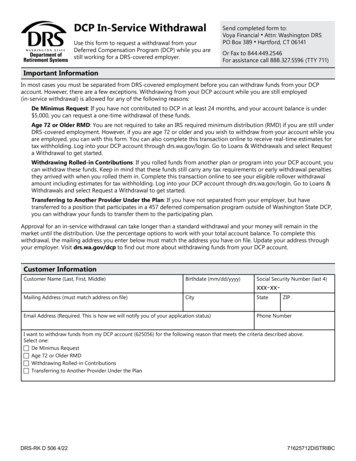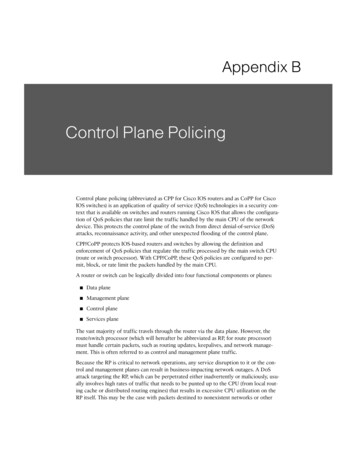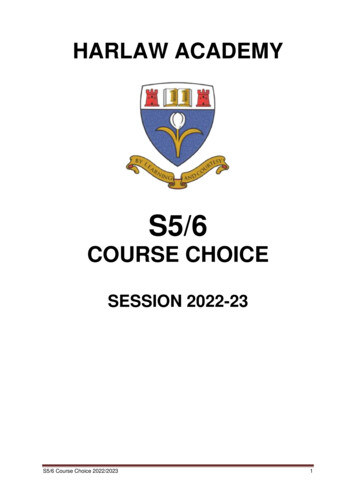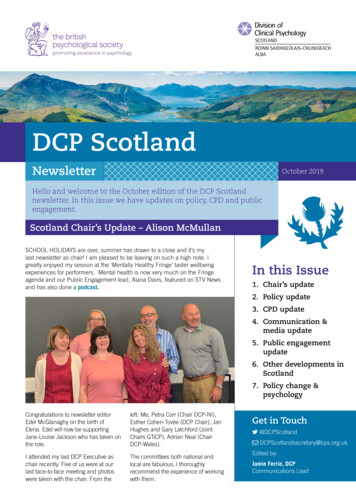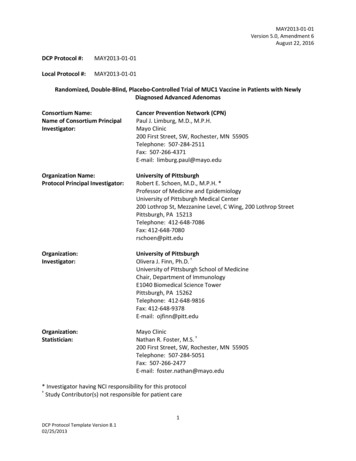
Transcription
MAY2013-01-01Version 5.0, Amendment 6August 22, 2016DCP Protocol #:MAY2013-01-01Local Protocol #:MAY2013-01-01Randomized, Double-Blind, Placebo-Controlled Trial of MUC1 Vaccine in Patients with NewlyDiagnosed Advanced AdenomasConsortium Name:Name of Consortium PrincipalInvestigator:Cancer Prevention Network (CPN)Paul J. Limburg, M.D., M.P.H.Mayo Clinic200 First Street, SW, Rochester, MN 55905Telephone: 507-284-2511Fax: 507-266-4371E-mail: limburg.paul@mayo.eduOrganization Name:Protocol Principal Investigator:University of PittsburghRobert E. Schoen, M.D., M.P.H. *Professor of Medicine and EpidemiologyUniversity of Pittsburgh Medical Center200 Lothrop St, Mezzanine Level, C Wing, 200 Lothrop StreetPittsburgh, PA 15213Telephone: 412-648-7086Fax: tor:University of PittsburghOlivera J. Finn, Ph.D. †University of Pittsburgh School of MedicineChair, Department of ImmunologyE1040 Biomedical Science TowerPittsburgh, PA 15262Telephone: 412-648-9816Fax: 412-648-9378E-mail: ojfinn@pitt.eduOrganization:Statistician:Mayo ClinicNathan R. Foster, M.S. †200 First Street, SW, Rochester, MN 55905Telephone: 507-284-5051Fax: 507-266-2477E-mail: foster.nathan@mayo.edu* Investigator having NCI responsibility for this protocol†Study Contributor(s) not responsible for patient care1DCP Protocol Template Version 8.102/25/2013
MAY2013-01-01Version 5.0, Amendment 6August 22, 2016Participating Organizations:Organization and Site Principal InvestigatorUniversity of Pittsburgh Medical Center – PA015200 Lothrop Street, Pittsburgh, PA 15213Site Co-investigatorsOlivera J. Finn, Ph.D.Phone: 412-648-9816Fax: 412-648-9378Email: ojfinn@pitt.eduRobert Schoen, M.D., M.P.H.Phone: 412-648-7086Fax: 412-648-7080Email: rschoen@pitt.eduJohn McKolanis, Ph.D.Cell phone: 412-508-7671Fax: 412-383-8098Email: mckolani@pitt.eduPaul J. Limburg, M.D., M.P.H.Phone: 507-284-2511Fax: 507-266-4371Email: Limburg.paul@mayo.eduMayo Clinic in Rochester, MN – MN026200 First Street Southwest, Rochester, MN 55905Lisa A. Boardman, M.D.Phone: 507-284-2511Fax: 507-266-4371Email: Boardman.lisa@mayo.eduUniversity of Puerto Rico – PR008PR Cancer Center, PMB 371, PO Box 70344San Juan, PR 00936-8344Priscilla Magno-Pagatzaurtundua, M.D.Phone: 787-620-8716 x 223Fax: 787-758-8303Email: Priscilla.magno@upr.eduMarcia Cruz-Correa, M.D., Ph.D.Phone: 787-759-0306Fax: 787-758-8303Email: Marcia.cruz1@upr.eduMariella C. Rodriguez Suarez, M.D.Phone: 787-206-3915Fax: 787-538-8303Email: marerodz@gmail.comNoneMassachusetts General Hospital – MA034Institute for Technology Assessment, 101 MerrimacStreet, Boston, MA 02114Chin Hur, M.D.Phone: 617-724-4411Fax:Email: chur@mgh-ita.orgThomas Jefferson University – PA121132 South 10th Street, 1170 Main, Philadelphia, PA19107Leo Katz, M.D.Phone: 215-955-8108Fax: 215-955-3965Email: leo.katz@jefferson.eduDaniel Quirk, M.D.Phone: 215-955-8108Fax: 215-955-3965Email: Daniel.quirk@jefferson.eduDavid Kastenberg, M.D.Phone: 215-955-8108Fax: 215-955-3965Email: david.kastenberg@jefferson.edu2DCP Protocol Template Version 8.102/25/2013
MAY2013-01-01Version 5.0, Amendment 6August 22, 2016Kansas City VA Hospital – MO029Department of Veteran’s Affairs, 4801 E. LinwoodBlvd. (151), Kansas City, MO 64128Amit Rastogi, M.D.Phone: 816-861-4700Fax: 816-861-1110Email: amit.rastogi@va.govAjay Bansal, M.D.Phone: 816-861-4700Fax: 816-861-1110Email: ajay.bansal@va.govFox Chase Cancer Center – PA086333 Cottman Avenue, Philadelphia, PA 19111Stephen Heller, M.D.Phone: 215-214-1424Fax: 215-214-1425Email: Stephen.heller@fccc.eduMinhhuyen Nguyen, M.D.Phone: 215-214-1424Fax: 215-214-1425Email: minhhuyen.nguyen@fccc.eduJeffrey Tokar, M.D.Phone: 215-728-2577Fax: 215-728-3639Email: Jeffrey.tokar@fccc.eduDavid Weinberg, M.D., M.Sc.Phone: 215-214-1424Fax: 215-214-1425Email: David.weinberg@fccc.eduIND Sponsor:NCI, DCPIND##15885Agent(s)/Supplier:Contract #MUC1 peptide, U. of Pittsburgh/Poly ICLC adjuvant: Oncovir, Inc.HHSN261201200042IProtocol Version Date: August 22, 2016Protocol Revision orAmendment #Version 5.0, Amendment 63DCP Protocol Template Version 8.102/25/2013
CONTACTSQuestions:Test scheduleStudy visits and proceduresSpecimen handlingSubject eligibility, Test tsAdverse events, Forms completionParaffin-embedded biospecimensAdverse EventsCPN Lead Site CoordinatorProtocol ndomizationUnblinding of Study AgentsMonitoringAll other biospecimensBiospecimens collection and shipmentContact Name:Lynda DzubinskiLead Study CoordinatorUniversity of Pittsburgh Medical CenterPhone: 412-648-9116; Fax: 412-648-9924Email: lyd1@pitt.eduApril FeltCPN Research Base Quality Assurance Specialist andPathology CoordinatorPhone: 507-538-0268 Fax: 507-266-3722E-mail: felt.april@mayo.eduPat McNamaraCPN Research Base AdEERS CoordinatorPhone: 507-266-3028 Fax: 507-284-9628E-mail: mcnamara.patricia@mayo.eduColleen GarveyCPN Research Base Program CoordinatorPhone: 507-284-2180 Fax: 507-266-4371E-mail: garvey.colleen@mayo.eduSharon KaufmanCPN Research Base Senior Research ProtocolSpecialistPhone: 507-293-1605 Fax: 507-266-4371E-mail: kaufman.sharon@mayo.eduKarrie FursaCPN Research Base Research Protocol SpecialistPhone: 507-266-2218 Fax: 507-266-4371E-mail: fursa.karrie@mayo.eduCPN Registration Office (8:00-4:30 Central Time)Phone: 507-284-4130; Fax: 507-284-0885E-mail: random01@mayo.eduAnne HollandCPN Research Base Compliance CoordinatorPhone: 507-293-7795Email: Holland.anne@mayo.eduRoxann M. Neumann, RN, BSN, CCRPCPN Research Base Biospecimen Resource ManagerPhone: 507-538-0602 Fax: 507-284-8105E-mail: neumann.roxann@mayo.edu4DCP Protocol Template Version 8.102/25/2013MAY2013-01-01Version 5.0, Amendment 6August 22, 2016
SCHEMAMAY2013-01-01Version 5.0, Amendment 6August 22, 2016Randomized, Double-Blind, Placebo-Controlled Trial of MUC1 Vaccine in Patients with NewlyDiagnosed Advanced Adenomas Target populationMale and female participants between 40 and 70 years of ageRecent diagnosis (within 1 year) of 1 advanced adenoma defined as: an adenoma 1 cm in size,or with villous or tubulovillous histology,or withTitlehigh-grade (or severe) dysplasia.ProtocolInformed ConsentPre-Registration Screening Evaluation (n 120)Office visit, physical exam, laboratory studies (to confirm eligibility), and verification of advancedadenoma statusRegistration/Randomization (n 110 eligible participants; Week 0)Assuming 8% ineligibility after Week 0 screeningMUC1 Vaccine Injection(See Section 7.1 for Schedule)(n 55 eligible participants)Placebo (normal saline) Injection(See Section 7.1 for Schedule)(n 55 eligible participants)5DCP Protocol Template Version 8.102/25/2013
MAY2013-01-01Version 5.0, Amendment 6August 22, 2016 Study: Parts 1 and 2Vaccine vs. placebo injection with blood sampling for titer at weeks 0 (pre-injection titer), 2, and10 weeksCompletion of Part 1: Titer collection at week 12.Part 2: Week 16, 28 and 40 telephone monitoring.Titer collection at week 52 (pre-booster titer).Week 53: booster vaccine vs. placebo injectionCompletion of Part 2: Week 55 Titer collection (post booster), followed by telephone call followup at week 57.Endpoints:o Comparison of the immunogenicity at week 12 of a MUC1 peptide vaccine withadjuvant (administered at 0, 2, and 10 weeks) (Part I endpoint)o To evaluate the ability of the vaccine to elicit a long-term memory response (Key PartII endpoint)o To assess adverse events to the MUC1 peptide vaccine in comparison to placeboduring Parts I and IIPart 3: Post Intervention Follow Up(n 45 expected evaluable participants per arm)Monitoring for adenoma recurrence (Weeks 57 - 156)Telephone monitoring approximately every 6 months post booster administration.Titer collection near timing of surveillance colonoscopy (approximately year 3)Completion of Part 3: Post colonoscopy follow up and obtaining of tissue blocks from surveillancecolonoscopyEndpoint:o To compare the adenoma recurrence rate from surveillance exams occurring at least1 year and up to 3 years after Week 0 vaccine administration - MUC1 peptide vaccinevs. placebo (Part III key secondary endpoint).Off Study6DCP Protocol Template Version 8.102/25/2013
GLOSSARYMAY2013-01-01Version 5.0, Amendment 6August 22, 2016aa – Amino acidAA – Advanced adenomaADL – Activities of daily livingAE – Adverse eventsADCC – antibody-dependent cell-mediated cytotoxicityANA – Antinuclear antibodyBAP – Biospecimens Accessioning and ProcessingCACC – Colitis-associate colon cancerCPN – Cancer Prevention NetworkCRF – Case report formCTL – Cytotoxic T-lymphocytesDCP – NCI, Division of Cancer PreventiondsRNA – double-stranded RNAFAP – Familial adenomatous polyposisFDA – Food and Drug AdministrationHNPCC – Heritable nonpolyposis colorectal cancerIBD – Irritable bowel disorderIFNs – InterferonsIgG – ImmunoglobulinsIND – Investigational new drugIRB – Institutional Review BoardMDSC – Myeloid derived suppressor cellsMUC1 – Mucin 1 (high molecular weight type I transmembrane glycoprotein)NCI – National Cancer InstituteNK – Natural killer cellsNF-kB – Nuclear factor kappa-light-chain-enhancer of activated B cellsOAS – Oligoadenylate synthetasePBMC – Peripheral blood mononuclear cellsPO – Participating OrganizationPoly-ICLC – Polyinosinic-Polycytidylic acid stabilized with poly-L-lysine and carboxymethylcellulose(Hiltonol )PKR – Protein kinase receptorSAE – Serious adverse eventsT52 – Antibody titer at week 52Th cells – T-helper cellsTLR – Toll like receptorVNTR – Variable number of tandem repeatsWIWI – Was It Worth It Questionnaire7DCP Protocol Template Version 8.102/25/2013
TABLE OF CONTENTSMAY2013-01-01Version 5.0, Amendment 6August 22, 2016Cover Page . 1Participating Institutions. 2Contacts . 4SCHEMA . 5Glossary . 71. OBJECTIVES1.1Primary Objective . 111.2Secondary Objectives . 111.3Translational Objectives . 112. BACKGROUND . 112.1Study Disease: Advanced Adenomas . 162.2Study Agent: MUC1 Vaccine (MUC1 peptide/Poly-ICLC) . 162.3Rationale . 162.4Studies Planned in the Proposed Clinical Trial . 173. SUMMARY OF STUDY PLAN . 193.1Study Parts . 193.2Study Design. 203.3Vaccine and Clinical Endpoints . 204. PARTICIPANT SELECTION . 214.1Pre-Registration . 214.2Registration/Randomization . 224.3Inclusion of Women and Minorities . 234.4Recruitment and Retention Plan. 235. AGENT ADMINISTRATION. 235.1Dose Regimen and Dose Groups. 235.2Vaccine Administration . 235.3Run-in Procedures. 245.4Concomitant Medications . 245.5Contraindications . 245.6Dose Modification . 245.7Adherence/Compliance . 246. PHARMACEUTICAL INFORMATION . 246.1Study Agent (IND#15885, NCI, DCP) . 246.2Reported Adverse Events and Potential Risks . 266.3Availability . 276.4Agent Distribution . 276.5Agent Accountability . 276.6Packaging and Labeling . 276.7Storage . 288DCP Protocol Template Version 8.102/25/2013
6.86.96.10MAY2013-01-01Version 5.0, Amendment 6August 22, 2016Participant Pre-Registration and Registration/Randomization . 28Blinding and Unblinding Methods . 30Agent Destruction/Disposal . 307. CLINICAL EVALUATIONS AND PROCEDURES . 317.1Schedule of Events . 317.2Baseline Testing/Prestudy Evaluation. 347.3Evaluation During Study Intervention. 347.4Evaluation at the Completion of Study Intervention . 357.5Post-Intervention Follow Up Period . 357.6Methods for Clinical Procedures . 358. CRITERIA FOR EVALUATION AND ENDPOINT DEFINITION . 358.1Primary Endpoint . 358.2Secondary and Translational Endpoints. 358.3Off Agent Criteria . 368.4Off Study Criteria . 378.5Study Termination. 379. CORRELATIVE/SPECIAL STUDIES. 389.1Rationale for Methodology Selection . 389.2Comparable Methods . 3810. SPECIMEN MANAGEMENT. 3810.1Laboratories . 3810.2Collection, Handling, and Shipping Procedures . 3810.3Tissue Banking. 4011. REPORTING ADVERSE EVENTS AND DEVIATIONS . 4111.1Adverse Events and Deviations . 4111.2Serious Adverse Events . 4412. STUDY MONITORING . 4512.1Data Management . 4512.2Case Report Forms . 4512.3Source Documents . 4512.4Data and Safety Monitoring Plan . 4612.5Sponsor or FDA Monitoring . 4612.6Record Retention . 4612.7CRADA/CTA . 4713. STATISTICAL CONSIDERATIONS . 4713.1Study Design/Description . 4713.2Randomization/Stratification . 4813.3Accrual and Feasibility . 4913.4Primary Objective, Endpoint, Analysis Plan . 4913.5Secondary Objectives, Endpoints, Analysis Plans . 499DCP Protocol Template Version 8.102/25/2013
13.613.713.813.913.10MAY2013-01-01Version 5.0, Amendment 6August 22, 2016Reporting and Exclusions . 50Evaluation of Toxicity . 50Evaluation of Response . 51Interim Analyses. 52Ancillary Studies . 5214. ETHICAL AND REGULATORY CONSIDERATIONS . 5314.1FDA Form 1572 . 5314.2Other Required Documents . 5314.3Institutional Review Board Approval . 5314.4Informed Consent . 5414.5Submission of Regulatory Documents . 5414.6Other . 5415. FINANCE, EXPENSES, AND/OR INSURANCE . 55REFERENCES . 55INFORMED CONSENT TEMPLATE . 58APPENDICES. 69APPENDIX A. Performance Status Criteria . 70APPENDIX B. Recruitment and Retention Plan Template . 71APPENDIX C. Was it Worth It Questionnaire . 79APPENDIX D. Pre- and Post-Vaccine Risk, Regret, and Symptom Surveys. 80APPENDIX E. Vaccine Report Card . 92APPENDIX F. Calculation of NAS Score . 9710DCP Protocol Template Version 8.102/25/2013
MAY2013-01-01Version 5.0, Amendment 6August 22, 20161. OBJECTIVES1.1 Primary ObjectiveThe primary objective of this trial is to compare the immunogenicity at week 12 of a MUC1 peptidevaccine with adjuvant (administered at 0, 2, and 10 weeks) in participants with a history of an advancedadenoma, randomized to receive MUC1 peptide vaccine versus placebo (Part I endpoint). 1.2 Secondary ObjectivesSecondary objectives which correlate with the planned parts of the study include:To evaluate the ability of the vaccine to elicit a long-term memory response. We will administer abooster injection of the vaccine or placebo at week 53. Anti-MUC1 antibody response will be assessedat week 55 and compared to the week 52 pre-booster vaccine level (T55/T52). (Part II key secondaryendpoint).To compare the adenoma recurrence rate from surveillance exams occurring at least 1 year and up to 3years after Week 0 vaccine administration – MUC1 versus placebo (Part III key secondary endpoint).To compare the adenoma recurrence rates between MUC1 and placebo by excluding the following typesof adenomas. These adenomas are excluded since they may represent missed or residual adenomasfrom the baseline exam. These analyses are exploratory.o Participants with adenomas 5 mm,o Participants with adenomatous tissue which may represent residual adenoma at the site of theprevious advanced adenoma,o Participants with adenomatous tissue detected in the same segment of the bowel as theprevious advanced adenoma.To assess adverse events to the MUC1 peptide vaccine in comparison to placebo during Parts I and II.To assess patient reported injection site reaction events from the Vaccine Report Card.1.3 Translational ObjectivesTo compare the anti-MUC1 antibody titer at the time of surveillance colonoscopy for the purpose ofevaluating the anti-MUC1 antibody response in relation to adenoma recurrence. Since surveillancecolonoscopy is generally at 3 years after an advanced adenoma, this titer will typically be obtained atapproximately week 156.To evaluate MUC1 expression on baseline advanced adenomas and on recurrent adenomas detected atsurveillance colonoscopy. Based on current knowledge of MUC1 expression and function in tumor cells,MUC1 negative adenomas are not expected to grow as immune escape variants. This has never beentested before, and the trial will provide an appropriate setting to study this issue.To evaluate levels of circulating myeloid derived suppressor cells (MDSC) in the vaccinated and theplacebo group and correlate with anti-MUC1 antibody levels and adenoma recurrence.To establish a biospecimen repository archive including live cells, plasma, and germline DNA for futureimmunologic (e.g. MUC1-specific T cells) and other assays (systems biology approach to detectdifferences between responders and non-responders), testing not currently accommodated within thebudget of this trial.2. BACKGROUNDRandomized controlled trials demonstrate that endoscopic removal of adenomatous polyps reducescancer incidence1, 2. However, there are many more adenomas than cancers, adenomatous polyp11DCP Protocol Template Version 8.102/25/2013
MAY2013-01-01Version 5.0, Amendment 6August 22, 2016recurrence rates are high, and repeated colonoscopic surveillance to monitor and remove recurrentadenomas is invasive, expensive, and associated with medical risk. Furthermore, surveillancecolonoscopy is frequently misapplied, with excessive colonoscopy in low risk individuals and inadequatecolonoscopy in some high risk individuals 3. Immunotherapy targeting antigens known to be aberrantlyexpressed on colon cancers and polyps offers the potential for a relatively non-invasive and non-toxicprevention strategy, and because of the specificity of the immune response and its long-term memory,offers the potential for prolonged protection. Data suggest that aberrant expression of tumor antigensis subject to immune surveillance. During evolution from premalignant lesion to tumor, tumor-specificantibodies and T cells can be identified that in many animal models and human studies have beencorrelated with better prognosis. In a large study in colon cancer, that has now been repeated numeroustimes and in different types of tumors, infiltration of primary tumors with T cells was the best predictorof increased survival, surpassing even the cancer stage predictive value 4. MUC1 vaccines to boostimmune responses have been tested in colon cancer patients with advanced metastatic disease with aclinical response between 10% and 14%5. While the immune responses induced were by and large weakdue to the generally immunosuppressed state of patients with advanced disease, in 22 studies thatmeasured vaccine induced immune responses, humoral immunity was seen in 59% of patients andcellular immunity in 44%5. The limited effect of vaccine therapy in established cancer is now known tobe due to numerous immunosuppressive mechanisms that develop in the cancer patient over time,caused either by the tumor or the immunotoxicity of standard cancer therapy, or both. Drugs, such asipilimumab, are under development or being employed to modulate the tumor microenvironment tofavor vaccine efficacy. However, most of these drugs are highly toxic in addition to being very expensive.An opportunity to bypass these barriers is presented by the discovery that many of the tumor antigensin cancer vaccines are also expressed on precursor lesions, e.g. adenomatous polyps as precursors tocolon cancer, PanINs to pancreatic cancer and CINs to cervical cancer, suggesting that immunization ofpatients with pre-malignant lesions before the tumor and cytotoxic therapy suppresses the immuneresponse is possible and may be preferred. Our hypothesis is that a vaccine that elicits or boostsimmune surveillance early in the oncogenic process will prevent malignant disease by eliminatingpremalignant lesions and preventing their recurrence and their progression to cancer. We are testingthis hypothesis in the best elucidated pathway of premalignant to malignant progression, adenomatouspolyp to colon cancer. The antigen we propose is MUC1, a tumor-associated antigen abnormallyexpressed on polyps and colon cancer 6, 7, and the population for the planned intervention is individualswith advanced adenomas, a group at high risk for colorectal cancer, even years after initial diagnos
MAY2013-01-01 Version 5.0, Amendment 6 August 22, 2016 . 5. DCP Protocol Template Version 8.1 02/25/2013. SCHEMA . Randomized, Double-Blind, Placebo-Controlled Trial of MUC1 Vaccine in Patients with Newly


